What Is the Fastest Way to Heal a Scratched Eye?
Ask our dispensing optician
Your request was successfully submitted!

Reviewed by
Beck Jinnette
Disclaimer: We at SmartBuyGlasses are not medical doctors. This article contains general advice. If your scratched eye is weeping or extremely painful, consult your doctor or an eye care professional for treatment.
What is a scratched cornea?
A scratched eye is quite a common injury that, thankfully, usually heals itself. The specific part of the eye concerned is the cornea.
The cornea is the transparent front part of the eye that covers the iris and the pupil. It allows light to enter and helps the eye to focus. It is the most protrusive and exposed part of the eyeball, so it can become damaged or scratched relatively easily in a number of ways.
A scratched cornea is also known as a corneal abrasion. Although corneal abrasions are generally minor eye injuries, they can still cause significant pain. If left untreated, an eye infection or corneal ulcer can develop, so it’s important to know how to deal with one.
Corneal abrasion causes & risk factors
Corneal abrasions can occur quite easily through a combination of your own hands and foreign objects coming into contact with the eyeball. Accidental poking with a pen, makeup brush, or fingernail is a common cause, as are small particles like sand, dust, or ash entering the eye.
We often instinctively rub our eyes when this happens, which can create friction between the small particles and the cornea, causing an abrasion. Even without the presence of corneal foreign bodies, rubbing your eyes too hard can scratch the cornea. Overuse of contact lenses or improper contact lens hygiene is another risk factor.
Playing sports or engaging in other physical activities without proper protective eyewear leaves you open to the possibility of a scratched cornea, while they can also stem from certain types of eye infections. Even eye surgery can be responsible for a corneal abrasion if sufficient eye protection is not used.
DID YOU KNOW
Vitamin C boosts your immune system, helping your body to fight off infections and heal wounds quickly.
Corneal abrasion symptoms
It’s possible to scratch your cornea without immediately realising that it has happened. You will likely feel the effects of it, although they too can take some time to set in. The first symptom is usually pain when opening or closing the eye, or the feeling that there is something stuck in it.
Some of the following symptoms will also likely be present in the case of a corneal abrasion:
- Watery eyes or excessive tearing
- Redness in the eye
- Sudden sensitivity to light
- Swelling of the eyelids
- Sudden blurred vision or loss of vision
- Eye twitching
- Nausea
- Dull headache
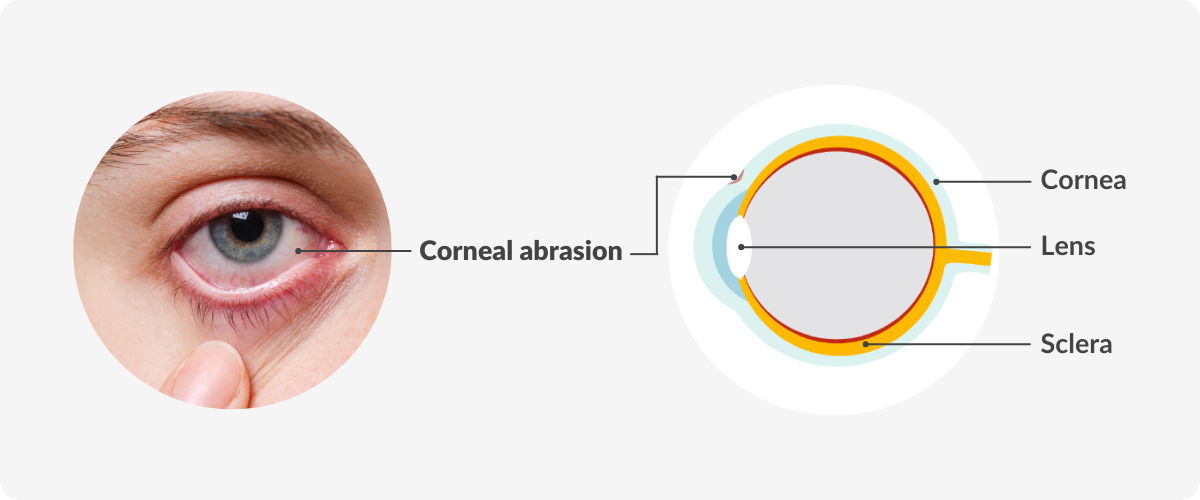
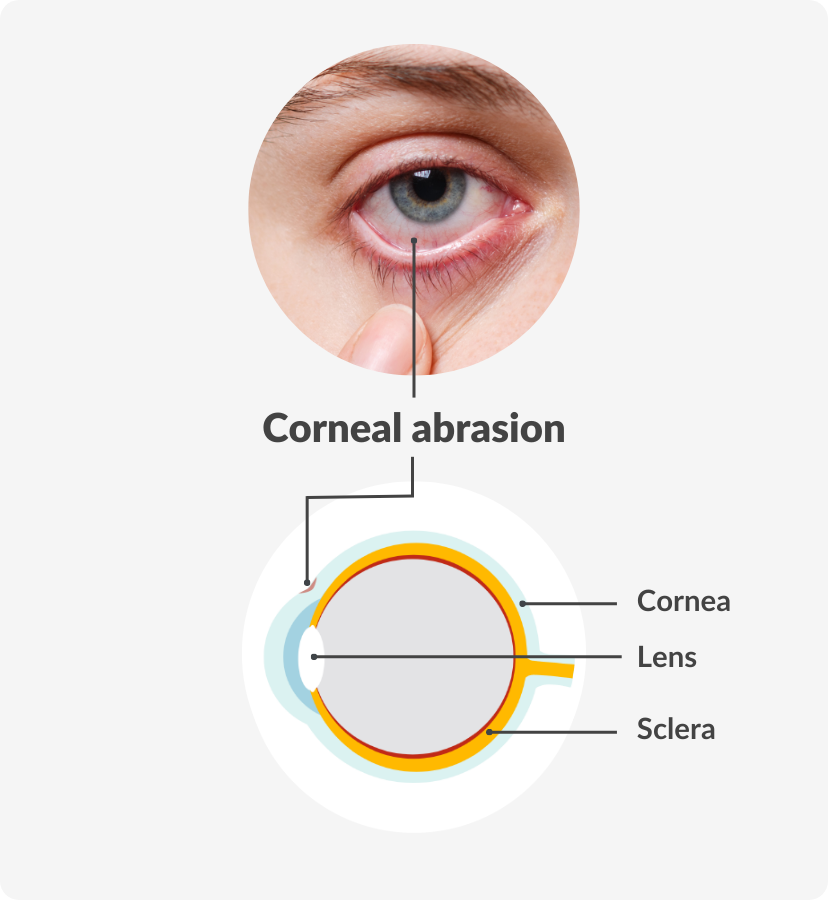
How to deal with a suspected corneal abrasion
Experiencing some of the above symptoms is not a surefire indicator that your cornea is scratched, as they can also be symptoms of other, unrelated eye problems. However, a combination of them after exposure to some of the risk factors cited in this article means there’s a good chance that you have indeed scratched your eye.
If you suspect that you may have a corneal abrasion, here are some steps you can take to prevent the situation from worsening:
- Consult an eye doctor
- Flush the eye out with water or saline solution, without rubbing it (but no more than once or twice)
- Wear sunglasses to reduce light sensitivity
- Use a cold compress to relieve swelling, pain, and discomfort
- Keep your face and eyelids clean
- Rest your eyes and avoid straining them
You may be tempted to try and take action to minimise your pain or discomfort, but you could end up doing more harm than good. If you suspect your cornea is scratched, make sure you go see your doctor and avoid doing the following:
- Don’t rub your eye
- Don’t try to remove anything from your eye with tweezers or any other instruments
- Don’t apply an eye patch unless instructed to do so by an eye doctor
- Don’t wear eye makeup
- Don’t wear contact lenses until your eye doctor tells you it’s ok
- Don’t try to flush out your eye with anything other than clean water or sterile saline solution
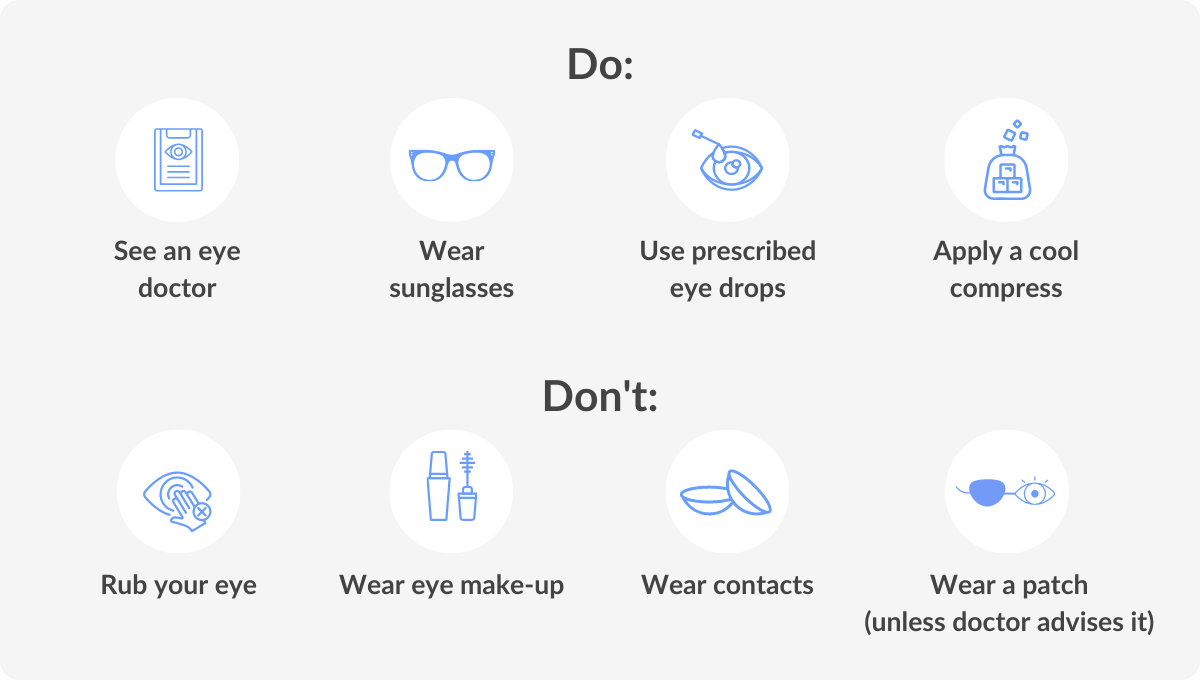
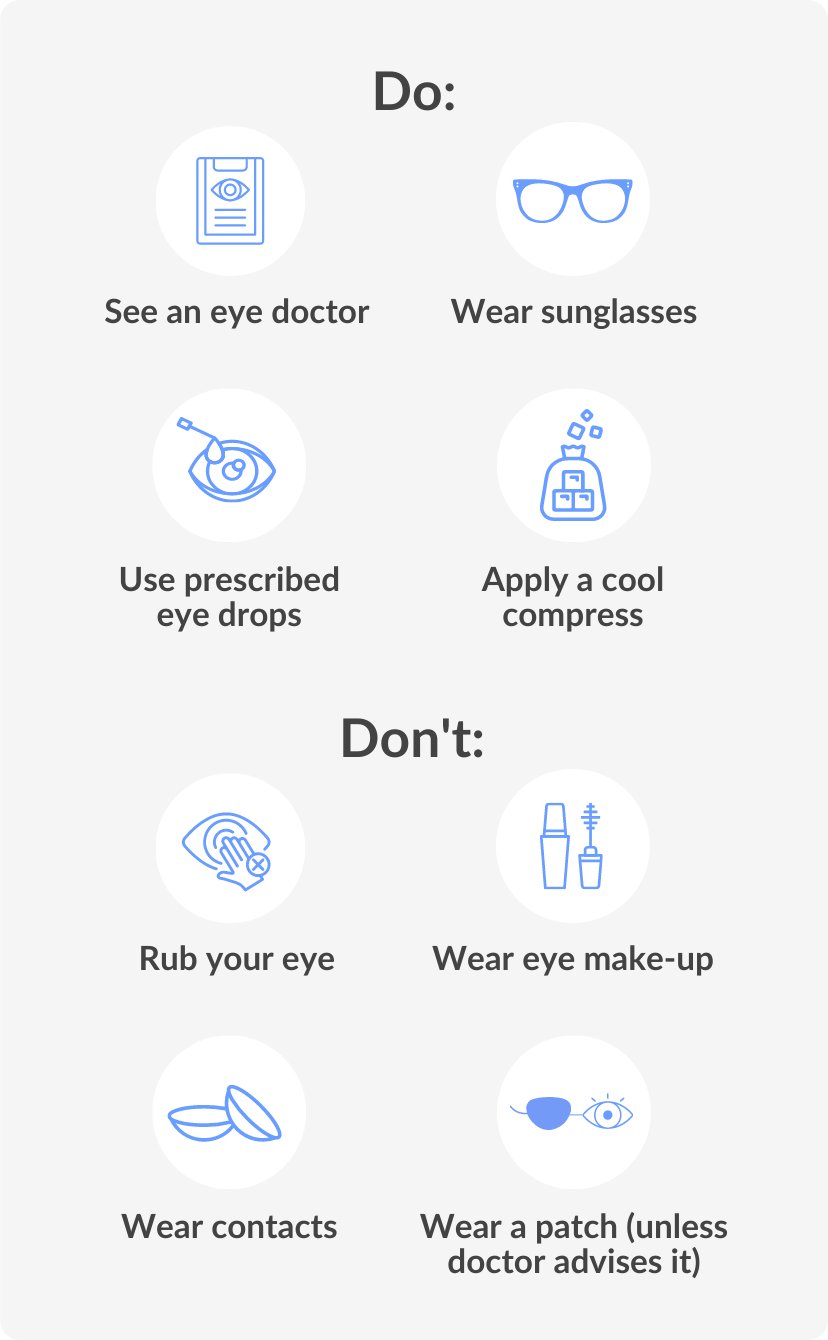
How to treat a scratched cornea
The steps above are to be followed as soon as you suspect you may have a corneal abrasion and should help relieve irritation. As they’re often mild to moderate, most corneal abrasions heal by themselves, so medical intervention is not always strictly necessary. But we recommend seeing your doctor if it doesn’t begin to subside within a day or two.
If there is continued eye pain, a change in vision, or light sensitivity after the scratch or eyeball trauma, seek emergency care. A foreign object lodged in the eye, a loss of vision, or a high-force impact on the eye may require a visit to the emergency room.
Medical treatment
An eye doctor will be able to remove any small object that may be lodged in the eye, and also examine it for damage and check your vision. If they need to remove an object, they’ll apply topical anesthesia on the eye so it won’t hurt, and use an appropriate instrument to extract the particle.
They may then prescribe you antibiotic eye drops or ointment to prevent infection, or pain relievers. Ciprofloxacin or moxifloxacin eye drops are common choices for this. In some cases, the doctor may apply a bandage contact lens or therapeutic contact lens. They protect the cornea, relieve pain associated with blinking, and aid the cornea’s healing process.
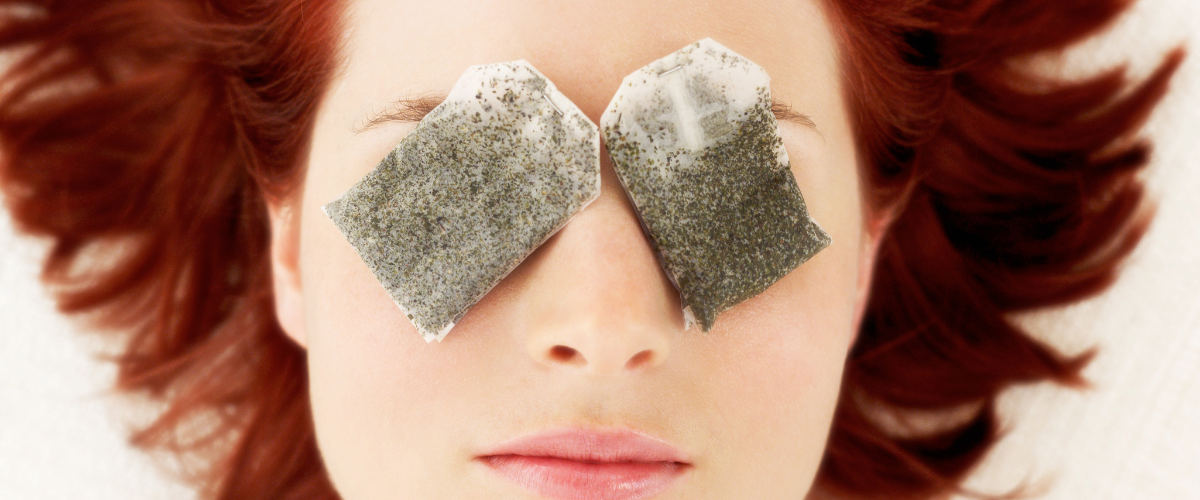
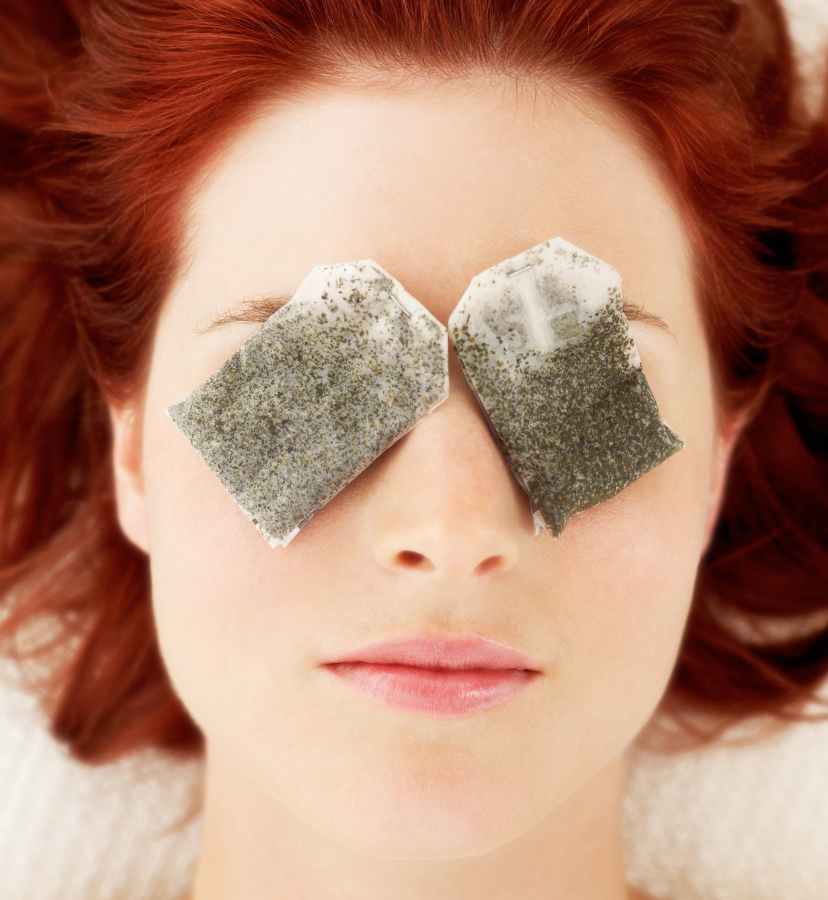
Recovery time
The saying goes that time heals all wounds, and with most eye scratches, that rings true. In the majority of cases, there is only a minor scratch, so generally, the eye heals in 24-48 hours. Following the guidelines laid out in this article should help the injury subside in this timeframe.
If you’ve suffered a scratched eye and are still experiencing symptoms after 48 hours, consult an eye doctor, and they will examine your eye and treat the injury accordingly.
Prevention is better than a cure
While there are best practices you can follow when you have a scratched eye, there is no immediate fix. The best way to avoid the pain and discomfort that come with a corneal abrasion is to take appropriate precautions to prevent one from happening in the first place.
In outdoor or work situations where there is a risk of foreign matter like metal particles or sand entering the eye, wear safety glasses. The same applies to playing sports with an elevated risk of something coming into contact with the eyes.
In the event that something does enter your eye, resist the urge to rub it. Instead, blink several times or gently pull the upper eyelid over the lower eyelid. Rinsing with water or saline solution can flush the object out before it has time to do any damage.
A small scratch on your eye may heal relatively quickly, but if you can avoid one altogether, you’ll save yourself some pain.





































